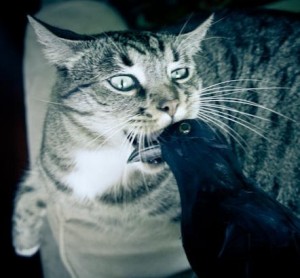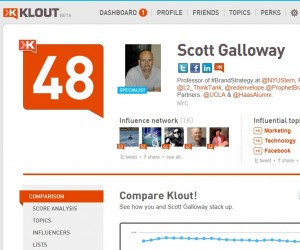 A thought-provoking exchange in the comments on Danny Brown’s marketing blog recently caught my eye, inspiring my pick for November 2011 video clip of the month. From Brown:
A thought-provoking exchange in the comments on Danny Brown’s marketing blog recently caught my eye, inspiring my pick for November 2011 video clip of the month. From Brown:
“@RichBecker Sweet Lord, seriously, mate? A professor grades based on Klout? How screwed up is that?
“You nailed it with the dehumanization of the online (and, to a degree, offline) populace, mate. By encouraging people to only connect with “influencers”, as decreed by Klout and their screwy algorithm, we’re essentially creating the equivalent of the Aryan nation dream from 60 years ago.
“Sad times indeed.”
His comment was in response to one from Rich Becker, author of the CopyWrite, Ink blog and writing, editing, and social media professor at the University of Nevada, Las Vegas. A ton of negative blog posts have been written about Klout this week after the influence metrics service released a new algorithm, causing many users’ scores to drop 15 or more points (mine personally dropped 16) and some heavy Facebook users’ scores to rise. Many are complaining the new algorithm rewards people for posting mindless information on Facebook or ignoring everybody with low Klout scores on Twitter. From Becker:
“Danny,
“I find myself growing more concerned about Klout, especially in the way some people use it. The real advent of social media is that it allowed people to connect, especially those who would not otherwise connect.
“With scoring systems like Klout, which is taken more seriously than I ever imagined it would be, it disrupts those early benefits by reinforcing a new tier of elitism and disconnect. This is especially true with the new algorithm because engaging with people who have lower scores can lower a score. (Not that I care, but some people do).
“I know most people dismiss is outright, and I certainly wish I could. But the truth is that this service is being applied in the worst possible way by a growing number of people. I’ve read articles of otherwise respectable companies that do look at Klout scores for hiring purposes. I’ve seen people (people we know) alter their network accounts to earn better scores by ignoring people with lower scores or unfollowing them outright. And just yesterday, learned about a professor who bases a portion of his students’ grade on their Klout score. This wasn’t just a random professor or story. It was in the Wall Street Journal.
“I’ve never been a fan of Klout, but mostly because it overreaches in selling its own relevance. But lately, it has become much harder to not think of the system (not the people who work there) as truly evil in how it elevates vanity. This really presents a problem for me because, on one hand, I’m not really an anti-anything kind of person. But on the other, this does have some tangible and negative ramifications because it dehumanizes people. When I look at how Klout it used, I always get the feeling at this is a great wrongness that needs to be keep in check or could be adopting in any number of ways I’ve mentioned above.
“Thanks for continuing to cover it. I often have mixed feelings about whether or not I want to risk giving them more exposure.
“All my best, Rich”
 I did a little Googling after reading the exchange and found more on the professor grading based on Klout. The marketing professor, Scott Galloway of New York University (NYU) Leonard N. Stern School of Business (@profgalloway) on Twitter, is shown in minute 3:18 of my video clip of the month threatening to publicly humiliate his students with the lowest Klout scores. A post on NYU Stern’s website elaborates, noting the top five students in his Brand Strategy class at mid-semester won an all expenses paid trip to Shanghai, China, to participate in a social media clinic. The top students at mid-semester were Keren Mizrahi, on Twitter as @KerenRM; Johanna Pesso, on Twitter as @JohannaP83; Ari Wolfe, on Twitter as @Eflow03; Asha Shivaji, on Twitter as @AshaLS; and Dorottya Csegezi, on Twitter as @doroteee.
I did a little Googling after reading the exchange and found more on the professor grading based on Klout. The marketing professor, Scott Galloway of New York University (NYU) Leonard N. Stern School of Business (@profgalloway) on Twitter, is shown in minute 3:18 of my video clip of the month threatening to publicly humiliate his students with the lowest Klout scores. A post on NYU Stern’s website elaborates, noting the top five students in his Brand Strategy class at mid-semester won an all expenses paid trip to Shanghai, China, to participate in a social media clinic. The top students at mid-semester were Keren Mizrahi, on Twitter as @KerenRM; Johanna Pesso, on Twitter as @JohannaP83; Ari Wolfe, on Twitter as @Eflow03; Asha Shivaji, on Twitter as @AshaLS; and Dorottya Csegezi, on Twitter as @doroteee.
I checked today’s Klout scores (Nov. 1, 2011) for Professor Galloway and his trip winners. All of them except one has a higher Klout score than Professor Galloway. The Klout score of the one exception is just one point lower. Their Klout score rankings today are:
- Asha Shivaji: 54
- Ari Wolfe: 52
- Keren Mizrahi: 51
- Dorottya Csegezi: 50
- Professor Scott Galloway: 48
- Johanna Pesso: 47
I find it ironic that the star students of a professor who designed a course on the importance of showing “how important you are” (NYU post quotes) are likely to always outshine him under Klout’s new algorithm. I can’t be the only one who thinks it’s crazy to believe graduate students have more influence than their marketing professor (especially one at a major university).
To rise above his star students under Klout’s new algorithm, however, Professor Galloway must choose to converse exclusively online with people with top Klout scores, ignoring many of his students and certainly most new ones. He also might consider talking about puppies and what he eats for lunch every day on Facebook. Neither option is very professorial, at least in my book.
What a funny (or sad) twist of fate.
Enjoy the video below (with the NYU class at minute 3:18).
What are your thoughts? Do you think professors should grade based on Klout? How much weight do you put into Klout and the other scoring systems?
Ah. Very interesting. When I read this, I thought “that professor’s name sounds familiar.” And lo and behold, yep, it’s the same professor that was behind this, which caused quite a ruckus on blogs: http://deadspin.com/5477230/nyu-business-school-professor-has-mastered-the-art-of-email-flaming
He certainly has a flair for the dramatic. Your point about his students being “more influential” than him is a salient one. I wonder if he’s thought about that.
@jenzings Wow! Thanks so much, Jen, for filling in more gaps in the Professor Galloway’s notoriety resume. To think I was a little worried about my post being too hard on the professor!
This is sad. Students being taught simplistic and wholly unreliable one-click faux metrics are not being served well.
Context, comprehension and intent are just some of the elements that will determine whether or not a message moved someone to action, changed their behaviour and/or more. Someone please show me how Klout, PeerIndex and HubSpot’s Twitter Grader do any of that. They don’t.
New shiny things (like Klout) can be interesting and even addictive. That doesn’t mean they have one scintilla of value beyond simply counting … something. Some people seek an easy path. Perhaps it is due to their ignorance of measurement. Please note, ignorance is not a pejorative term. I’m not saying they are stupid. I’m suggesting they may just not know know much about what they are teaching. There is a difference. It is still sad.
Well said. I have many issues with Klout–I don’t think it’s useless, I just think some people (like this professor, and HR types) are using it in a very wrong way. I take a great degree of comfort in noting that many with any serious measurement chops have the same concerns I do about Klout (and any other “influence” scoring tool). @rdfrench
@rdfrench Thanks for stopping by on my blog. I couldn’t have said it any better. I hope you come back again!
Hey Monica,
I’m the Marketing Manager here at Klout and wanted to clear something up. Engaging with people with lower scores does NOT lower your Score. To clarify:
1. Influence isn’t about you, it’s about your audience. We believe influence is the ability to drive action. You can tweet, post, blog, and be witty and insightful to your heart’s content, but influence begins when someone takes action on your content. This could be retweeting, commenting, liking, sharing, responding, or doing a handstand of joy (the latter is harder to measure). In reality, you have your audience and connections to thank for your influence. 2. Everyone (and anyone) can help your Klout. Your grandmother liking your Facebook status updates? That’s Klout. Your friend from high school congratulating you on your recent job change? That’s Klout. Your network commenting and discussing your latest blog post? That’s Klout. Whenever someone is influenced by you (and we can measure that), it helps your Klout Score.
3. Yes, quality and breadth matter. All things being equal, having Barack Obama react to your content means more than if I do. All things being equal, having more people respond to your content raises your Score. The Klout Score is a combination of all of these factors: the number of people you influence, how much you influence them and how influential they are.
Thanks,
Megan, Marketing Manager, Klout
meganberry
Hi Megan, Thanks so much for taking the time to comment on my blog. I am relieved to learn engaging with people with lower Klout scores won’t lower your Klout score. You seem to imply, however, that interacting with people like President Obama will raise it, thereby encouraging the “equivalent of the Aryan nation dream” @DannyBrown mentioned.
I know in my own case, the only people Klout seems to pick as someone I influence under its new algorithm are people with lower Klout scores than me. Klout often seems to pick the people with the absolutely lowest scores, even if I’ve only interacted with the person once (such as somebody who responded to something I tweeted about the World Series). My influence under the new algorithm has fallen sharply with my interactions with/influence over people with low Klout as the key change. Previously, Klout had me influencing some big names in public relations and social media, which in some cases was ridiculous too. May of these people were the ones influencing me.
Again, I appreciate the fact you took the time to comment on my blog and fully explain the factors Klout uses to calculate scores. Now that you mention it, I don’t see the business value in Klout’s scoring factors either. But that’s a different (and long) subject altogether. See http://www.eventuresincyberland.com/2011/11/the-klout-fallacy-from-its-marketing-manager-herself/. Monica